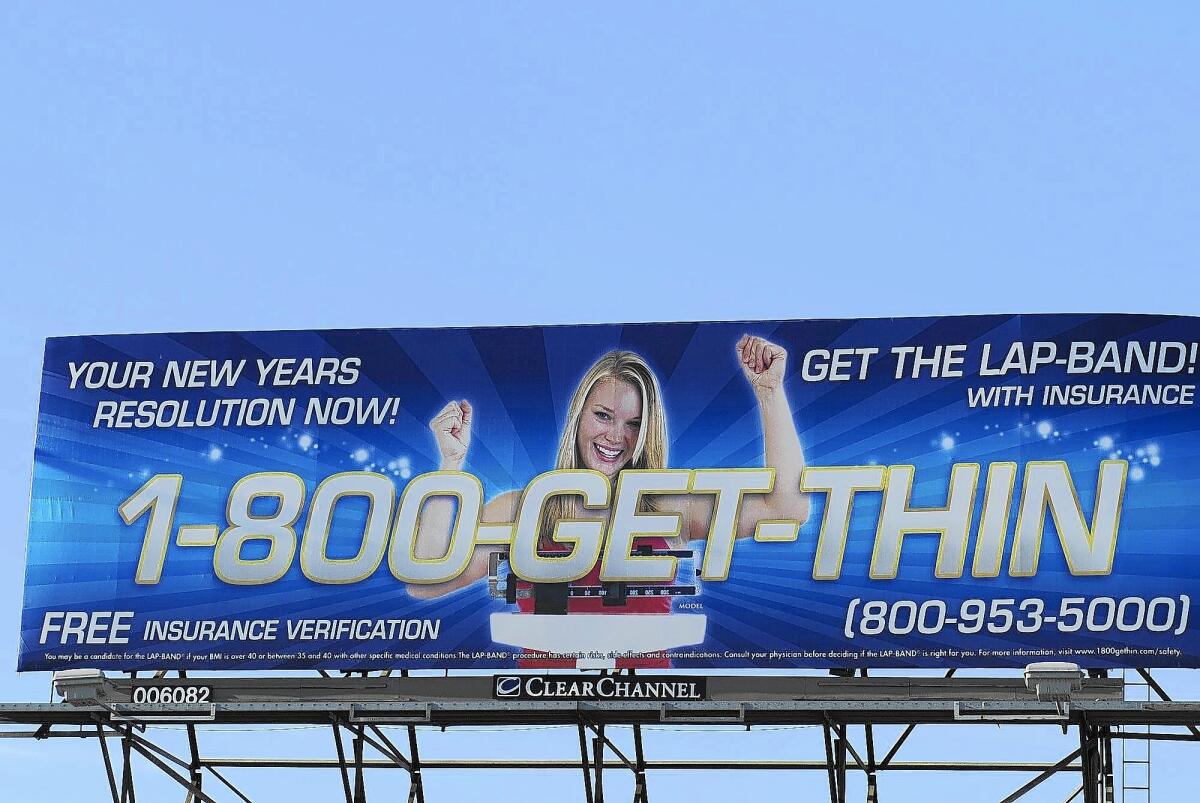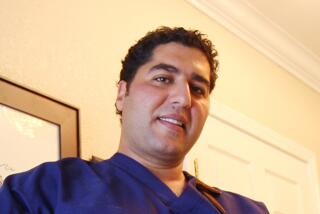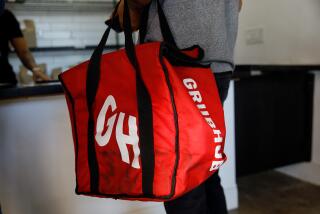Brothers behind Lap-Band ads sued

The nation’s largest health insurance company has accused the brothers behind the 1-800-GET-THIN advertising campaign of defrauding the insurer of more than $40 million by operating a complex weight-loss surgery billing scheme.
UnitedHealth Group Inc. contended in a lawsuit that Michael and Julian Omidi operated a network of companies that tricked the insurer into paying claims for medical procedures that were unnecessary, ineligible for coverage or never even performed.
The companies advertised for several years on Southern California freeway billboards, radio and television with a catchy slogan: “Let your new life begin, call 1-800-GET-THIN.”
UnitedHealth filed the lawsuit Sept. 3 in federal court in Los Angeles, about six months after several of the surgery centers sued the insurer seeking millions of dollars in unpaid claims for Lap-Band surgeries. Both lawsuits are now pending before U.S. District Judge Michael W. Fitzgerald.
An attorney who represents the surgery centers denied UnitedHealth’s allegations and said he would seek to have the lawsuit dismissed.
“There was certainly no systematic attempt to defraud an insurance company,” said Daron Tooch, who represents several surgery centers sued by UnitedHealth. “It’s just a series of allegations designed to counteract the lawsuit we filed.”
UnitedHealth declined to discuss the lawsuit, issuing a short statement instead: “UnitedHealthcare will continue to vigorously litigate the claims and counterclaims affiliated with the 1-800-GET-THIN litigation.”
The lawsuit contends that UnitedHealth paid more than $43 million on “false and misleading” claims submitted by the Omidis’ companies. Multiple claims were for pre-surgery procedures that were not performed, including ultrasound, psychological and nutritional consultations, the lawsuit said.
The lawsuit also maintains that “false medical records” were submitted to support claims, including one instance in which a patient’s height was changed to bring her body mass index to a level that would meet her policy’s coverage requirements.
In addition to the fraudulent claims, the companies submitted claims that were “dramatically higher than the reasonable costs for such services,” UnitedHealth alleged.
The insurer said it received a claim that sought $31,000 for the use of an outpatient clinic’s operating room — for a procedure that lasted 32 minutes. The claim also sought $32,000 for a recovery room, even though the patient was discharged within 80 minutes of surgery, the lawsuit said. UnitedHealth said it did not pay those claims.
But it did pay claims that were in some cases more than 300% higher than other providers charged for the same procedures, the lawsuit said.
Tooch said there is nothing unlawful about a health provider submitting claims that are above industry standards.
“How much do you pay for popcorn in a movie theater, $6? And how much did they pay for the popcorn in the bag, less than a cent?” Tooch said. “If they didn’t want to pay, they shouldn’t have paid it. There wasn’t anybody who had a gun to their head, saying, ‘Pay this amount.’”
Further, Tooch said, UnitedHealth waited too long to dispute the claims.
“Now they have to find a reason for why they paid these claims and that’s why they’re manufacturing these allegations of fraud,” he said.
In the lawsuit, UnitedHealth defended its handling of the millions of healthcare bills it processes daily, saying it is inundated with healthcare claims and unable to carefully screen them before making payments.
“United receives nearly 2 million healthcare claims per day and must comply with various laws and regulations mandating that such claims be paid within a short period of time,” the company said in the lawsuit. “By practical necessity, United must reasonably and in good faith rely on the veracity of the descriptions of the services rendered as stated on the claims form and the amount of the bill submitted by the provider for each service.”
UnitedHealth’s allegations come two years after several law enforcement agencies opened an investigation of the Omidis for “potential violations of federal law, including conspiracy, healthcare fraud, wire fraud, mail fraud, tax violations, identity theft [and] money laundering,” according to a statement by a U.S. Food and Drug Administration criminal agent in a court filing in an unrelated criminal case. No charges have been filed.
The 1-800-GET-THIN campaign was pulled in 2012 after the FDA warned the companies that the advertisements failed to include adequate warnings about the potential risks of Lap-Band surgery.
Five patients died from 2009 to 2011 after Lap-Band surgeries at clinics affiliated with the ad campaign, according to lawsuits, autopsy reports and other public records.
A spokesman for the U.S. attorney’s office in Los Angeles declined this week to discuss the investigation. John Hueston, an attorney who represents the Omidi brothers, did not respond to a request for comment.
In June, federal agents served search warrants at a Hollywood Hills home and the Omidis’ Beverly Hills offices as part of the ongoing investigation, according to a law enforcement official who was not authorized to discuss it.
Twitter: @spfeifer22







